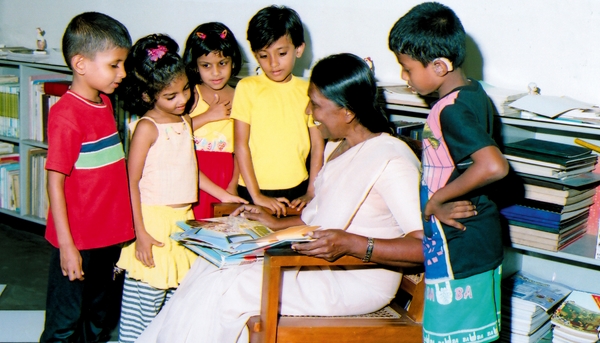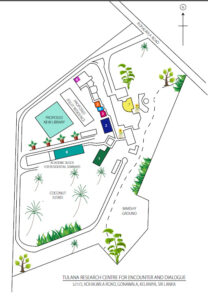CEHIC -
CENTRE FOR EDUCATION OF HEARING IMPAIRED CHILDREN
Lumbini Mawatha, Dalugama. Kelaniya, Sri Lanka.
Co-Founders (in 1982) :
Rev. Sr. Greta Nalawatta (Sisters of Perpetual Help)
Rev. Fr. Aloysius Pieris s.j.
A SMALL MIRACLE IN SRI LANKA
Where the deaf hear and the mute speak
The miracle that is the CEHIC today emerged out of two strong founding principles – free education for all hearing impaired children and an ethos of inter-religious and inter-ethnic cooperation and harmony. It started from small and difficult beginnings in 1982. Its Foundress and present Directress, Sr. Greta Nalawatta of the Sisters of Perpetual Help began her unique work, the first of its kind in Sri Lanka, because she believed that hearing impaired children should be treated like normal hearing children and that their habilitation (not re‑habilitation) should begin from the pre‑school age, even as early as six to eight months old.
Sr. Greta, following in the Perpetual Help mission of educating and training the hearing impaired in Sri Lanka, advocated that hearing impaired children can be taught to hear and speak with the help of hearing aids and that they should be given a holistic education and integrated into the mainstream school system at the normal school‑going age of around five years. She insisted that hearing impaired children can go on to higher academic and social achievement and become equal creative partners with normal hearing people in building a better society.
Sr. Greta started her work alone in a small hut in the Gampaha District with just the teaching materials she had made with her own hands and seated on mats with the few children she had gathered after going from house to house in the villages searching for the little ‘deaf and dumb’ children who were being kept at home and not sent to school. Through various well-wishers she ensured that each child had proper hearing aids and also insisted on the daily attendance of one parent, mainly the mother, with the child.
Sr. Greta first concentrated on training teachers to help her. This was because she realised that the teacher, next to the parent, is the most important person in the life of thehearing impaired child. Using the small amounts of money she earned from giving English tuition, she trained and built up a small team of young women teachers to assist her in her work with the children and their parents.
It was only later that the steady evolutionary process began, with the help of various donor-institutions and individual well-wishers, of setting up a proper pre-school, educational centre and a parents’ Association to assist her. This has resulted in the specialised educational Centre of Excellence today with its team of teachers of both sexes, trained audiological and technical staff, administrative staff and domestic staff.

The CEHIC, which is administered by the ASSOCIATION FOR THE HEARING IMPAIRED CHILDREN (AHIC – a registered charity) and its legal arm THE HEARING IMPAIRED CHILDREN TRUST(HICT), is neither a private school nor a State school. It is a multi-ethnic, multi-religious Community School. The two Patrons of the Centre are the Ven. Valimitiyave Kusaladhamma Nayake Thera, a high ranking prelate of the Buddhist Sangha who heads the Peliyagoda Vidyalankara Pirivena (the seminary for Buddhist monks). He is also Chancellor of the University of Kelaniya. The other Patron is Rev. Fr. Aloysius Pieris, s.j., the Co-Founder of CEHIC and the Founder/Director of the Tulana Research Centre for Encounter and Dialogue. Both are members of the Board of Trustees. The President of the Board of Trustees is Prof. Sarath Amunugama from the University of Kelaniya.All the educational and other services at CEHIC are provided to the highest international standards and given free of charge thus making it accessible to the very poor. It is a unique institution in Sri Lanka.
The CEHIC bases its work with hearing impaired children on five principal areas –
1) the use of the AUDITORY ‑ VERBAL METHOD of education (and not sign language),
2) the morning PRE‑SCHOOL education programme which sets the ‘deaf’ children and their families on the path of becoming creative and full members of our society from the earliest age,
3) INTEGRATION into the mainstream educational system in Sri Lanka at the school-going age, and conducting extra daily classes in the afternoons in the key subjects of the national curriculum for the integrated children from YEAR ONE to YEAR ELEVEN (University entrance)
4) Providing a HOLISTIC education which includes training in music, dancing, arts and crafts, home science, sewing, woodwork, pottery, gymnastics, sports, etc. and
5) making the PARENTAL involvement in the child’s education a central pillar of the CEHIC programme. Besides the parental involvement in the Association, one parent accompanies their child every day, sits in the classroom alongside the child and learns the techniques and processes which are then continued in the home.Thus the school becomes the home and the home becomes the school.
The oldest groups of children from CEHIC are now young adults and are facing life in the real world with all its challenges. Those who have the ability are encouraged to go into higher education and some have entered university and obtained degrees. For those who wish to enter the world of work, CEHIC is now planning to develop its Vocational Training and Aftercare Centre. The Centre has a full-time complement of teachers, administrative and domestic staff and also part-time teachers.
The driving force of CEHIC is the HOPE it instils in every hearing impaired child that they too have a positive future as equal partners with every other member of society in building a just, prosperous and peaceful Sri Lanka.
Please visit the website : www.cehicsrilanka.org



